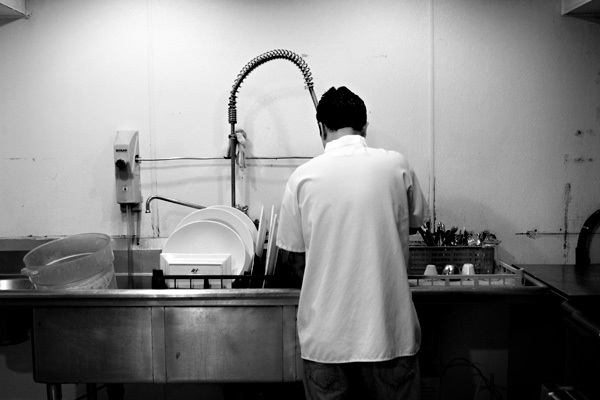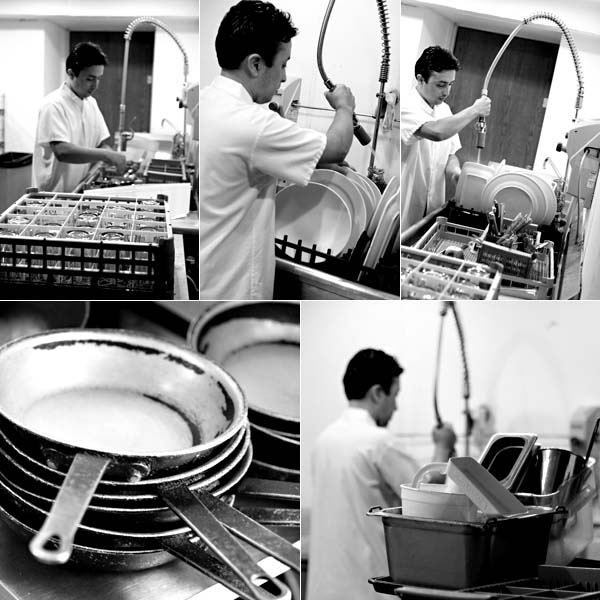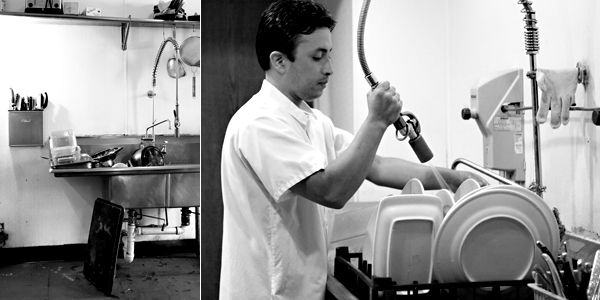
At many small restaurants, often one key person stands between the perfect night and an absolute fiasco. And no, it’s not the obvious answer. Neither the genius of the cooks nor the charm of the waitstaff could shine without the self-effacing dedication of the dishwasher.
For one Minneapolis kitchen, that person is the Deuce. The vertically challenged Ecuadorian’s modest appearance hides the fact that he is a master of his craft. Though his nickname is of unceremonious origins — it regards the fact that he is the second Fred to work at the restaurant — it has become a term of endearment in the back of the house. “[My job] is fun, no bad,” says the Deuce, whose grasp of English is rickety at best. “Good hours, good pay. Nothing else I want to do.”
But when you get right down to it, being a dishwasher is wearying, somewhat mind-numbing, and generally unpleasant. Keeping the kitchen stocked with a full array of plates, pots, and pans during a busy service requires one to constantly lug around 20-pound dish racks and stacks of plates. Of course, occasionally falling down a flight of stairs and destroying a few things in the process is a given.
If the physical wear-and-tear doesn’t get you, the boredom will. The Deuce copes by listening to KDWB, a hit local music radio station, all day. “Sometimes busy, sometimes nothing,” he says. “I need music. I like the songs. No understand, but I like.” Every night, his solitary basement dishpit is illuminated by visions of California girls and Escalades. Every night, the Deuce dreams.
No one really aspires to be a dishwasher. Traditionally, it has only been an appealing job for unskilled workers who wanted to gain a foothold in the restaurant world. However, increased culinary school enrollment has rerouted many of those workers and allowed immigrants like the Deuce to fill the void.
Like many of his peers in the industry, the Deuce has no culinary passions, no desire to become the next Anthony Bourdain: He just wants to work hard and save money. “Saving, saving, saving, saving,” he chants. His plan is to stay in the United States for 6 to 8 more years, and then go back to Ecuador for a while. His dream? “I need a big truck. Get a big truck, get a lot of ladies.”

In addition to his big truck fund, the Deuce saves money to send to his family back home, though there aren’t many people left there. In Ecuador, he was a welder and did fairly well money-wise. But even his comfortable situation wasn’t enough to resist the gravitation pull of the United States. “It’s crazy,” he says. “All my friends here said to come out here, it’s good. I have no more friends in Ecuador; everyone came to the US. So I say, OK.”
According to a 2009 report on immigration [PDF] by the University of Minnesota’s Institute of Public Affairs, immigrants make up 6.5% of the state’s total population. Despite that relatively low ratio — nationally, they make up 13% — their visible presence in the Twin Cities and other metropolitan areas seems to have set off some alarm bells among the state’s political leaders. This month, Governor Tim Pawlenty suggested that Minnesota declare English to be its official language. Meanwhile, Lino Lakes, a Twin Cities suburb, has already passed its own English-only resolution.
Despite those developments, rudimentary Spanish is often a prerequisite to working in a kitchen. “All the restaurants in Minneapolis have at one Ecuadorian, maybe two,” says the Deuce, who has lived and worked with many of his countrymen here. If one listens closely, one may hear shouts of “¡Caliente!” and “¡Necesito placas!” in most, if not all, urban restaurants.
The Deuce recognizes the regional tension over immigration, but he doesn’t understand it. “Americans don’t like Latinos; I don’t know why. Latinos only work, no troubles. Well, I sometimes ride my bike on the sidewalk… otherwise, no troubles.”
No matter what happens on the national or local scene, restaurants need their dishwashers. Their demographics will, of course, remain steady or change in response to larger trends. However, the nature of the work will remain the same. The work will be hard; the hours, long; the book deal, purely imaginary. No one will become famous washing dishes. But for the Deuce and his peers, it doesn’t matter. All they want to focus on is getting your placas to you on time.


Great article. When working in kitchens I feel it is important to recognize the importance of the dishwasher – and to keep him on my side! The Deuce sounds like a valuable element to this kitchen. Also, I love the photos. Very realistic and captures his work well.
Additional suggested reading:
http://www.dishwasherpete.com/BuytheBook/tabid/143/Default.aspx
by the highly regarded “Dishwasher” Pete Jordan, as well as:
http://www.amazon.com/dp/015626224X/?tag=heavytable-20
by some guy calling himself George Orwell.
Aww, I like Deuce. Bienvenido, Deuce!
Any reason you chose not to include the name of the restaurant? If this were a profile of a chef or cook it seems like that would be prominent information.
Tom, if the reason why they didn’t include the dishwashers real name and the name of the establishment doesn’t lead you to one obvious conclusion, then I don’t know what to tell you.